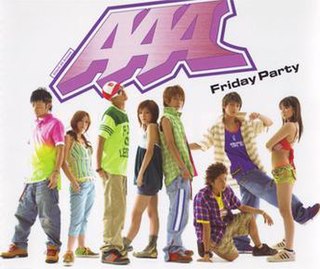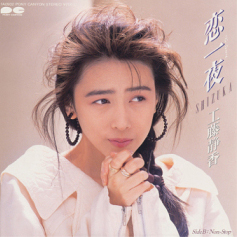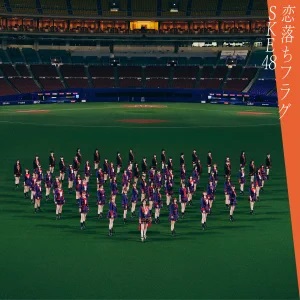
"Friday Party" is the second single by Japanese pop group AAA. The song was written by m.c.A.T and was included in the group's first studio album Attack. The single was released in Japan on October 5, 2005, under Avex Trax in two editions: a CD-only edition, and a CD and DVD edition. "Friday Party" debuted at number 17 on the weekly Oricon singles chart. The single charted for 10 weeks and went on to sell over 12,000 copies in Japan.

"Aitai Riyū/Dream After Dream " is a double A-side single by Japanese pop group AAA. It was released on May 5, 2010, via Avex Trax. The former was written by Kyasu Morizuki and the latter was written by Kenn Kato. Both songs were composed and produced by Tetsuya Komuro. "Aitai Riyū" is the theme song for the variety show that the group stars in Nihikime no Dojo. The single debuted at number-one on the Oricon Weekly Chart becoming their second number-one single and Komuro's forty-third. "Aitai Riyū" was one of 10 songs awarded a Japan Record Award in 2010.

"Makenai Kokoro" is a single by Japanese dance pop band AAA, released on August 18, 2010. It is their second consecutive single produced by Tetsuya Komuro, after "Aitai Riyū/Dream After Dream ".

"Blood on Fire" is the debut single by Japanese pop group AAA. The song was written by Osamu Sasaki and Mitsuhiro Hidaka, and produced by Max Matsuura. The single was released in Japan on September 14, 2005, under Avex Trax in two editions: a CD-only edition, and a CD and DVD edition. "Blood on Fire" debuted at number nine on the weekly Oricon singles chart. The single charted for 19 weeks and went on to sell over 46,000 copies in Japan.

"Still Love You" is a song by Japanese pop group AAA. It is their 32nd single and is included in the group's seventh studio album 777: Triple Seven. The song was written by Mitsuhiro Hidaka and Kaji Katsura. The single was released in Japan on May 16, 2012, under Avex Trax in four editions: a CD-only edition, a CD and DVD A edition, a CD and DVD B edition, and a Mu-Mo edition. "Still Love You" debuted at number three on the weekly Oricon singles chart. The single charted for seven weeks and went on to sell over 55,000 copies in Japan.

"Sailing" is a song by Japanese pop group AAA. It is their 31st single and is included in the group's seventh studio album 777: Triple Seven. The song was written by Mitsuhiro Hidaka and Tetsuya Komuro. The single was released in Japan on February 22, 2012, under Avex Trax in four editions: a CD-only edition, a CD and DVD A edition, a CD and DVD B edition, and a Mu-Mo edition. "Sailing" debuted at number four on the weekly Oricon singles chart. The single charted for six weeks and went on to sell over 45,600 copies in Japan.

"Charge & Go! / Lights" is the 30th single by Japanese pop group AAA. It is included in the group's seventh studio album 777: Triple Seven. "Charge & Go!" was written by Kenn Kato and Mitsuhiro Hidaka. The single was released in Japan on November 16, 2011, under Avex Trax in five editions: a CD-only edition, a CD and DVD A edition, a CD and DVD B edition, a box set edition, and a Mu-Mo edition. "Charge & Go! / Lights" debuted at number five on the weekly Oricon singles chart. The single charted for nine weeks and went on to sell over 52,400 copies in Japan.

"Call" / "I4U" s the 29th single by Japanese pop group AAA. It is included in the group's second best of album AAA Best. The song was written by Kenn Kato and Mitsuhiro Hidaka. The single was released in Japan on August 31, 2011, under Avex Trax in six editions: CD and DVD A and B editions, CD-only C and D editions, and two Mu-Mo editions. "Call" / "I4U" debuted at number five on the weekly Oricon singles chart. The single charted for nine weeks and went on to sell over 42,300 copies in Japan.

"777 " is a song by Japanese pop group AAA. It is their 33rd single and is included in the group's seventh studio album 777: Triple Seven. The song was written by Mitsuhiro Hidaka and Leonn. The single was released in Japan on July 25, 2012, under Avex Trax in three editions: a CD-only edition, a CD and DVD edition, and a Mu-Mo edition. "777 " debuted at number four on the weekly Oricon singles chart. The single has charted for two weeks and went on to sell over 39,400 copies in Japan.

777: Triple Seven is the seventh studio album by Japanese music group AAA. The album spawned four singles prior to its release—"Charge & Go! / Lights", "Sailing", "Still Love You", and "777 "—which all charted within the top five spots of the Oricon weekly singles chart.

"Otome Sensō" is the 8th single by the Japanese female idol group Momoiro Clover Z, released in Japan on June 27, 2012. It became Momoiro Clover's first single to be certified Gold by the Recording Industry Association of Japan for shipments of 100,000 copies.

Eighth Wonder is the eighth studio album by Japanese music group AAA, released on September 18, 2013. The album contains five singles that were previously released —"Niji", "Miss you/Hohoemi No Saku Basho", "Party It Up", "Love Is In The Air" and "Koi Oto to Amazora"— all of which made the top 10 on the Oricon weekly singles chart.

Da-ice, is a Japanese boy band. The group consists of five members: Yudai Ohno, Toru Iwaoka, Taiki Kudo, Sota Hanamura, and Hayate Wada. They were formerly signed to Universal Sigma until they transferred to Avex Trax in June 2020. They are currently managed by Avex Management Inc.

"Fukkatsu Love" (復活LOVE) is the 48th single by Japanese boy band Arashi. It was released on February 24, 2016 under their record label J Storm. "Fukkatsu Love" was used as the background song for the NTT DoCoMo d hits commercial. The single sold over 485,000 copies in its first week and topped the weekly Oricon Singles Chart. "Fukkatsu Love" was certified for Double Platinum by the Recording Industry Association of Japan (RIAJ).

"Power of the Paradise" is the 50th single by Japanese boy band Arashi. It was released on September 14, 2016 under their record label J Storm. "Power of the Paradise" was used as the theme song for NTV's news coverage of the 2016 Summer Olympics, which featured member Sho Sakurai as the main newscaster. The single sold over 420,000 copies in its first week and topped the weekly Oricon Singles Chart. The single was certified Double Platinum by the Recording Industry Association of Japan (RIAJ). "Power of the Paradise" was the 10th best-selling single of the year in Japan.
Days no mo, formerly known as Whiteeeen is a Japanese vocal group, produced by senior vocal group Greeeen. Its members, who debuted in their teens, keep their identities concealed from the public.

"I'll Be There" is the 51st single by Japanese boy band Arashi. It was released on April 19, 2017 under their record label J Storm. "I'll be there" was used as the theme song for the television drama Kizoku Tantei starring Arashi member Masaki Aiba. The single sold over 390,000 copies in its first week and topped the weekly Oricon Singles Chart. The single was certified Double Platinum by the Recording Industry Association of Japan (RIAJ).

"Koi Hitoyo" is a song recorded by Japanese singer Shizuka Kudo, released on December 28, 1988, by Pony Canyon as the lead single from her third studio album Joy (1989). Almost a year later to the day, Kudo marked her second appearance on Kōhaku Uta Gassen by performing "Koi Hitoyo".

"Arashi no Sugao" is a song recorded by Japanese singer Shizuka Kudo, released as a single by Pony Canyon on May 3, 1989. Although the song is one of Kudo's most recognizable hits, as well as widely considered to be her breakout hit, and despite the fact that it was included on the compilation album Harvest, released later that same year, it was never featured on any of Kudo's studio albums. At the fourth Japan Gold Disc Awards, "Arashi no Sugao" was one of the five recipients of the award for Best Single of the Year. In 2015, DAM asked their users to select their favorite Shizuka Kudo songs to sing karaoke to and compiled a top ten list; "Arashi no Sugao" was ranked number seven.

"Koiochi Flag" is the 27th single by Japanese girl group SKE48. It was released digitally and as a CD single on February 3, 2021, by Avex Trax. The song was written by Yasushi Akimoto and produced by Nobuaki Tanaka. Musically, it is a pop song. A music video premiered on January 12, 2021, to accompany the release of the song.



















